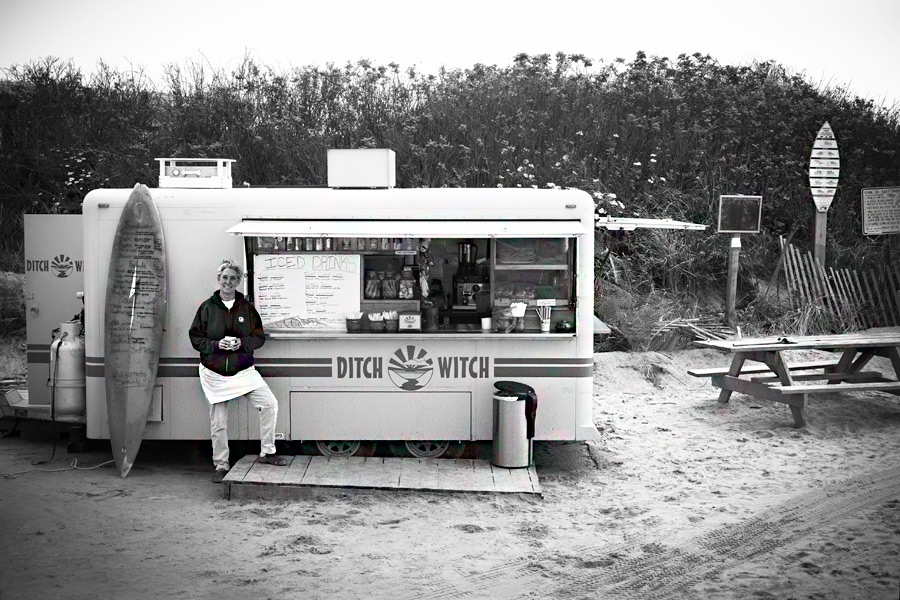Ditch Witch, Etcetra: Hamptons Food Trucks at the Beach

In the beginning, God created the stars and the sun and the beaches. Here in the Hamptons, people made picnic baskets of food and drink to bring to the beach and so enjoyed the waves and the sand with a soda and snack.
Seeing this, God created the Good Humor truck to, on occasion, go down to the beach to sell popsicles, ice cream cones and sodas to the thirsty beachgoers. Upon hearing the ding-a-ling of the Good Humor man, kids would run to their parents, ask for a penny, say, “Please! Please!” and then quickly run up to the dune to get stuff. Sometimes the kids got there before the truck left. Sometimes not. God saw that it was good. But he thought to do better.
Beginning around 1970, God created colorful beach trucks with little awnings above sliding glass windows that, parked in the lot at the back of a Hamptons beach, would sell hamburgers and hot dogs and potato chips in addition to the aforementioned popsicles and ice cream. The driver would stay maybe half a day, then move on to another beach to find new beachgoers who had not yet filled their bellies from Big Dave’s Delly, as a man named Dave might call his truck. People got to know the vendors. There’d be smiles all around.
The trouble began around 1980 when vendors began to arrive in larger numbers, determined to park at the particular beach where the largest number of bathers were. Sometimes two such vendors selling the exact same thing would park facing one another at opposite ends of the little parking lots, taking up twice as many parking spaces than just one would.
A few years later, when two such beach truck owners bad-mouthed to the patrons about the quality of their rival’s food, the cleanliness of their rival’s truck and the reliability of the other truck’s driver, God took notice.
In East Hampton, because of such a situation at Amagansett’s Indian Wells Beach around 1985, the town was forced to institute a peddler’s permit system. The permits cost $125 per season and $25 per day. If you did not behave yourself, the permits could be revoked. So people behaved better. And this continued along well for quite some time.
However, after the turn of the 21st century, even more people began coming to the more popular beaches. And when one beach vendor insisted on leaving his truck in its spot overnight at the beach, telling the authorities it was in need of repair and the truck part had to come from Kalamazoo so it might be there the whole summer, God had the Town create the “Mobile Food Concession Permit for Select Town Beaches.” The permit went to the highest bidder.
The application was pretty simple. It was a few pages long. Chosen were beach trucks operated by people who were friendlier than others, who lived close by, who had good credit, who were now serving healthy sandwiches, who painted up their trucks prettier, who seemed more interested in the environment and who gave their trucks really cutesy names. There were applications from the Gin Beach Wagon, the Paddy Wagon, the Dune Doggie and so forth. But in 2011, the townspeople where horrified to discover that the beach wagonDitch Witch, owned by Lily Adams and parked (with permit) at the Ditch Plains surfing beach for many years, had been beaten out by a newcomer called Turf Lobster Rolls.
People went nuts. Protests were organized, websites were created, letters to the editor were written.
“I have just found out about this situation in Montauk,” wrote Sam Pa’e of Hawaii. “It’s a sad moment for me and my heart goes out to Lily and the beach-going community of Ditch Plains. As a first time newcomer from Hawaii, Ditch Witch welcomed me in, watched my personal belongings and kept them safe. Lily made me feel at home and part of the Ditch Witch Ohana, which in Hawaii we call ‘family.’ My heart will be forever grateful for what Lily has done for me and sharing her ‘Aloha.’”
Laura Michaels wrote, “Ditch will not be the same without the Ditch Witch.”
John Behan, a former state legislator, wrote, “the Town Board is for the dogs. The Witch will live forever!!!”
In the end, the town supervisor at the time, Bill Wilkinson, went to a town board meeting waving a sheaf of papers. “We will review these original proposals. For instance, the first thing that jumps off the page at us is this Turf Lobster Rolls vendor that wins at Ditch Plains. They have a very limited menu. It starts at $17 for a lobster roll.” And so he pulled the plug on the new ordinance two weeks before Memorial Day, and the Ditch Witch stayed.
The new law they created after that debacle includes the same rules that you follow if you want to bid a job to construct a new bridge. The forms are 18 pages long. You sign them before a notary public. You make a bid, high enough you hope to get one of these treasured “select” beach spots, and you have to agree that though your bid might be the highest, it might not be the one selected because the town might select another who they felt could do a better job.
The town not only wants to see your menu, they want you to stick to your menu (no selling high-priced designer clothes on the side—yes, that was a problem). They want to know if you have enclosed a certified check with your bid (25 percent of the total), if you have insurance, if you agree to indemnify the town, if you agree to provide food that is approved by the Suffolk County Health Department, if you swear you are not colluding, consulting with or communicating with any other bidder, that your vehicle does not exceed 22 feet, and that you’ve been approved as an “Iranian Energy Sector Divestment” participant. The Iranian Divestment is pursuant to section 103-g of the NYS general Municipal Law. There are about 114 other things you have to agree to, but you get the idea.
This year, first bids were due to the town on April 2. All bids were rejected on April 16, and the town announced that everyone should rebid to a new deadline, which was April 23.
I spoke to Jeanne Carroza, the director of the East Hampton Town Purchasing Department, and she told me that too many forms were not filled out properly, there were names wrong, no beach parking lot selected, no certified check enclosed and so forth, and they had contacted these bidders to allow them the chance to rectify what was wrong—although it was doubtful that one man whose beach truck was a foot-and-a-half longer than 22 feet would be able to easily address that.
I asked Jeanne if there were any interesting items on any of the menus of any of the applicants, and she listed fish tacos, cantaloupe with a scoop of tuna in it and turkey wraps.
I learned that not all of the “select” locations were up for grabs this year because the contracts won are for two and three years, and so this is sort of a rolling thunder project. This year awards are up for two at Indian Wells, two at Ditch Plains, one at Gin Beach and one at Big Albert’s Landing. As for Lily’s spot, it too was up for bid this year. The decisions will be made at the next board meeting.
And God saw that it was good.



